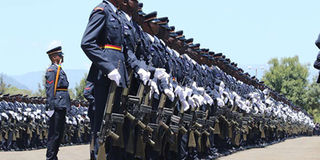To restore public confidence in the police, let officers wear body cams

Kenya Police College in Kiganjo, Nyeri County, holds a graduation ceremony on March 23, 2018. Every officer doesn’t qualify to carry a gun. PHOTO | FILE | NATION MEDIA GROUP
What you need to know:
- The government should have dealt with the concerns of the citizens around extrajudicial killings first before moving to arm private guards.
- In cases where police charge a civilian with fabricated evidence, it is the word of the police against the citizen. This should stop in the spirit of justice.
The arrest of a Cabinet secretary, governors, MPs, MCAs and an OCS recently confirms that the criminal elements were all along inside our opulent offices.
Those thieves from outside that watchmen guard against daily are the least of our problems. Essentially, we have entrusted our country to gangs in suits.
Kenya has become a magnet for underworld operatives who deal with illicit drugs, people smuggling and trafficking, commit fraud and trade in counterfeit and contraband goods.
Crimes that have thrived with the support of corrupt officials. To keep abreast with sophisticated criminals and the corrupt, police need to adopt modern ways for efficiency.
Arming private guards to deal with rise in crime is not a wise move. It is only going to add fuel to the fire, that is, corruption and human rights abuses.
It is also irresponsible to add them to the security portfolio without evaluating the performance of the police who have been under constant criticism following cases of extrajudicial killings and harassment over bribes.
POLICE KILLINGS
The government should remove its head out of the sand to realise the impact of extrajudicial killings on communities.
The latest report is of a young man shot at his home allegedly by police following the recent crackdown on gangs in Mombasa.
There has been an outcry from Kenyans who have lost loved ones to the indiscriminate shoot-to-kill policy.
The Director of Criminal Investigations George Kinoti and Director of Public Prosecutions Noordin Haji attended a meeting with Kayole residents recently and heard first-hand from victims’ families on the impact of police killings in their community. Yet, the killings continue.
Reports of police brutality or rise in crime will not be resolved by arming private guards.
The government should have dealt with the concerns of the citizens around extrajudicial killings first before moving to arm private guards. The move has only caused further unnecessary anxiety in the country.
VET OFFICERS
Private guards do not have a constitutional mandate to maintain law and order and should not be allowed to usurp the powers of the police, who are legally entrusted with our security.
Outsourcing of security matters is the last thing Kenya needs amidst the spike in corruption and organised crime.
Activities within the criminal justice system are seriously challenged by corruption, lack of funding and blurred lines caused by police, who play the role of the judge by meting out death sentences on our streets.
Adding private security guards will blur these lines further.
Allegations of extrajudicial killings now demand for disarming of the police and all those entrusted with guns in order to tame the trigger-happy officers. Every officer doesn’t qualify to carry a gun.
Neither is there proof that use of shoot-to-kill policy is the best way to deal with crime. There are less harmful ways to deal with criminals, such as stun guns.
BRIBERY
Leaving law and order solely in the hands of the police will not ease administration of justice. Legally, police bear criminal responsibility, individually and collectively, should our security be compromised.
The abuse of powers by the police does not end with extrajudicial killings. False accusations have been levelled against members of the public who refuse to bribe the police.
Motorists have borne the brunt of pathological bribe-hunting officers who, at times, force themselves inside private vehicles to coerce them of bribes.
Recently, a policewoman from Kasarani was recorded negotiating a bribe from a driver while she sat in his car.
It has become common practice for police to demand car keys as a ploy to induce bribes. This culture must change in order to protect the public from rogue officers.
JUSTICE
In cases where police charge a civilian with fabricated evidence, it is the word of the police against the citizen. This should stop in the spirit of justice.
The government should consider use of body cameras (also known as body cams) as essential and mandatory policing tool to protect citizens from false accusations.
This tool would also be effective in eradicating corruption in the service. Recently, a rogue traffic officer was unmasked in Florida, USA, incriminated by his own body camera planting drugs on unsuspecting motorists.
Use of body cameras should be extended to all activities of the police. By recording all interactions between the police and the public, the government will be able to restore trust between the two and, hopefully, streamline their operations.
EVIDENCE
To bring order to administration of justice, evidence provided by the police and not recorded on any device should not be admissible in court.
Claims have been made of Kenyans rotting away in remand on false accusations, including robbery with violence for failing to bow to the whims of bribe-hungry officers.
The 2010 Constitution has set a benchmark to modernise police operations and that must now include body cameras and other recording devices in order to change abuse culture by officers and tame corruption in the service.





